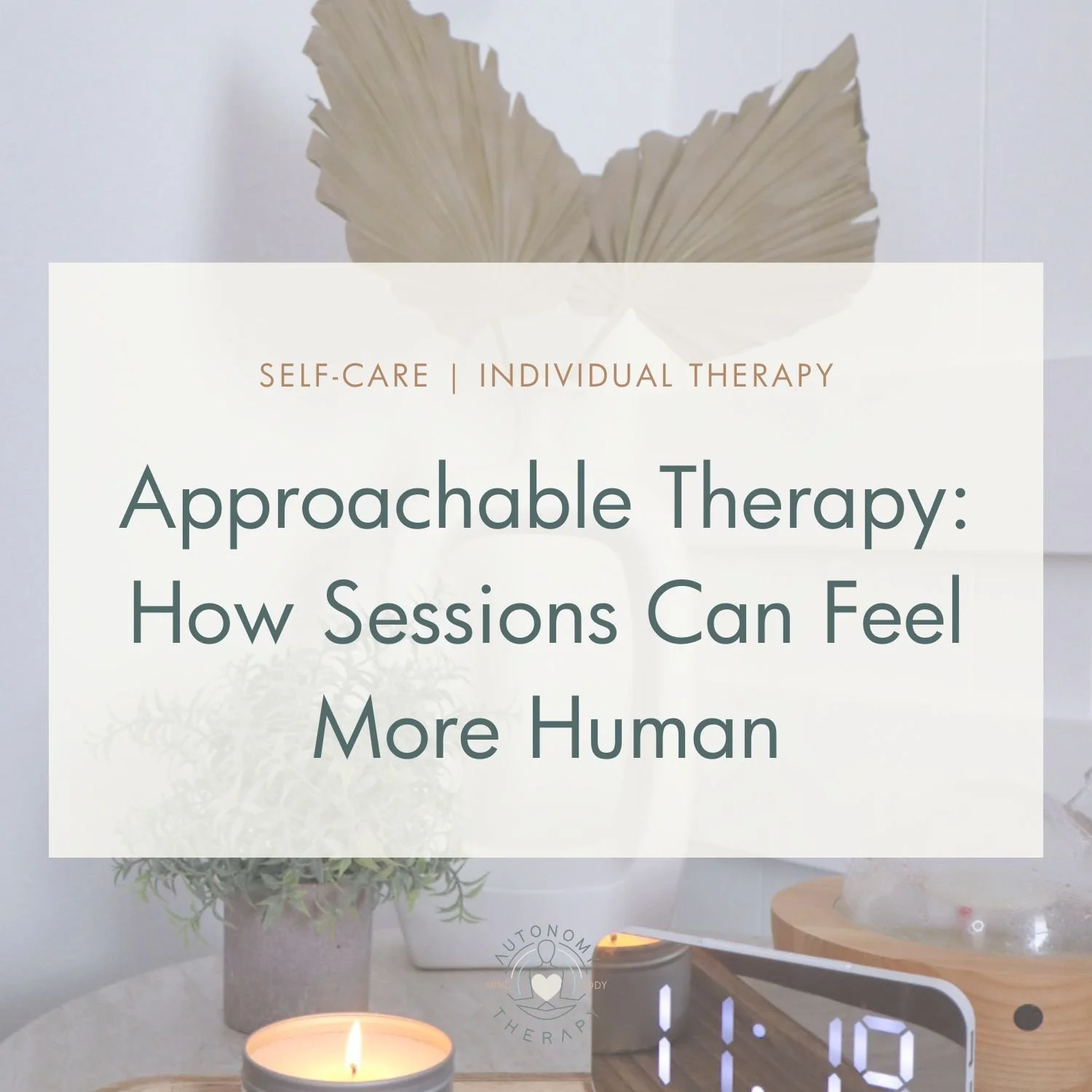Eating Disorder Treatment in Austin, Texas
How do I know if I need eating disorder therapy or treatment?
Do you find yourself thinking about food constantly? Have these overwhelming thoughts impacted your social life, work, personal relationships, and self-esteem? Are you ready to free your mind of its fixation on food and weight in order to make room for activities that bring you joy? Eating disorder treatment can help you take back autonomy of your body and your relationship with food. Our eating disorder therapists specialize in working with eating disorders and would be honored to be part of your recovery journey.
Eating disorder symptoms and behaviors vary between disorders and you may not fit neatly into one category. Some might even refer to this as “food disorder treatment.” A mental preoccupation with food and your body can be a significant sign that you are struggling and could benefit from eating disorder treatment.
Myths About Eating Disorders
-
Eating disorders do not discriminate based on gender identity, ethnicity, race, sexuality, body size, class, ability, or age. We recognize that LGBTQIA+ individuals often experience unique pressures around body image and identity. Our approach is sensitive to these challenges, offering affirming care that celebrates who you are.
Under representation of marginalized identities can lead to fewer individuals seeking help. Thus they are not getting appropriate services. We aim to make treatment accessible to ALL individuals struggling with eating disorders.
-
In reality, less than 6% of people with eating disorders are medically diagnosed as “underweight.” An individual does not need to be underweight to be taken seriously. For example, larger-bodied individuals may also have anorexia but are less likely to be diagnosed due to weight stigma. We must also remember that eating disorders encompass a variety of behaviors, not just restriction. Sadly, only 1 in 10 individuals with an eating disorder receive care, and we want to change this.
-
Studies show that there is a relationship between eating disorders and past trauma. As well as social injustices, stress, low self-esteem, and other mental health issues. They are not just superficial. For example, restriction may bring a sense of control to individuals who feel other aspects of their lives are out of their control. On the other hand, the act of bingeing can provide temporary emotional relief.
-
This is a dangerous misunderstanding. Eating disorders actually carry an increased risk of medical complications and psychiatric comorbidity. Such as anxiety disorders, mood disorders, and obsessive-compulsive disorders. As well as substance misuse, self-harm, and increased suicide risk. Close to 25% of individuals with eating disorders attempt suicide. Eating disorders are among the deadliest of mental illnesses, second only to opioid overdose.
(If you or a loved one are experiencing suicidal thoughts, reach out for help immediately. The NATIONAL SUICIDE PREVENTION LIFELINE can be reached at 1-800-273-8255 and is available 24/7. You can also text HOME to 741741 to connect with the Crisis Text Line.)
Eating Disorders Types & Their Symptoms
ANOREXIA NERVOSA
Anorexia Nervosa is characterized by a severe restriction of food intake to lose or maintain weight. In addition to a fear of gaining weight and a disturbance in how one’s body is perceived. It is one of the deadliest mental illnesses and has severe mental and physical health consequences. Anorexia is often coupled with depression, anxiety, or obsessive-compulsive disorders. One in five anorexia deaths is by suicide.
Our anorexia treatment team of therapists in Texas understand the importance of treating anorexia from a multidisciplinary approach. They aim to collaborate with other health professionals such as dietitians and medical doctors. Common signs and symptoms of anorexia nervosa include the following:
Dramatic weight loss
Preoccupation with food, calories, or weight
Denial of hunger
Avoiding eating in public
Refusing to eat specific categories of food
A strong desire for control
Avoiding social situations that may involve food
Developing food rules, rituals, or restrictions
Dressing in layers to stay warm or to hide weight loss
An intense fear of gaining weight
Social withdrawal
Dizziness
Fainting
Menstrual irregularities
Hair thinning
Muscle weakness
Anemia
Slow heart rate
AVOIDANT/RESTRICTIVE FOOD INTAKE DISORDER
Avoidant/Restrictive Food Intake Disorder (ARFID) is often referred to as “extremely picky eating.” However, it is a serious eating disorder that affects many individuals, particularly children. This disorder is not tied to the desire to lose weight. ARFID is often co-morbid with anxious and obsessive-compulsive behaviors. Research shows that ARFID is more common in boys than girls and in children who are neurodivergent. There are three main types of ARFID outlined below:
Sensory Avoidance: Individuals have issues with the texture, smell, and temperature of food.
Fear of Aversive Consequences: Individuals may associate eating with a “bad” experience. Such as almost choking, getting sick, having an allergic reaction, or vomiting.
Lack of Interest: Individuals have a true disinterest in eating and food and may get full quickly.
Common signs and symptoms of ARFID include a shortlist of acceptable foods, nutrient deficiencies, eating foods with similar characteristics (color, texture, etc.), delays in weight gain or growth, avoidance of vegetables or protein sources, and preference for a particular preparation of foods. Individuals with ARFID may also express emotional distress around meals and eating unfamiliar foods. This can lead to social difficulties in situations that involve food, such as mealtime or celebrations.
BULIMIA NERVOSA
Bulimia Nervosa is characterized by patterns of bingeing followed by purging. Bingeing is the consumption of large amounts of food in a short span of time. Whereas purging refers to the elimination of the calories consumed during a binge. Bulimia is often co-occurring with anxiety and mood disorders as well as substance use disorders. Common signs and symptoms of bulimia nervosa include the following:
Consuming a large quantity of food in a short period of time
Eating until uncomfortably full
Eating in private
Social withdrawal
Using compensatory behaviors to make up for calories consumed. For example purging or vomiting, overexercising, diuretics, laxatives, restricting or fasting, etc.
Feeling out of control when eating
Feeling shame about how much you eat
Fear of gaining weight
Discolored or stained teeth from induced vomiting
Bradycardia and other heart issues
Making trips to the restroom during and after meals
Strict adherence to an exercise schedule
ORTHOREXIA
Orthorexia is characterized by a fixation on "healthy" foods or "clean eating". To the point of restricting intake to only certain foods that are deemed "healthy." Orthorexia interferes with daily life and can affect interpersonal relationships. Symptoms and signs of orthorexia include the following:
Fear of processed foods
Obsessively checking nutritional labels and ingredients
Calorie-counting or macro tracking
Following “healthy lifestyle” influencers and bloggers
Avoiding social gatherings for fear of being pressured to eat “unhealthy” foods
Cutting out food groups (sugar, carbs, etc.) or adopting a lifestyle that restricts food (gluten-free, vegan, vegetarian, pescatarian, etc.) unrelated to a medical condition or a moral or religious belief
Perfectionism
Rigid and inflexible food rules and exercise routines
Our Approach to Eating Disorder Treatment in Austin, TX
We approach eating disorder and food disorder treatment from a weight-inclusive lens. You might be wondering what that means. We honor differences in size, race, ethnicity, gender, sexuality, class, religion, and other critical pieces of your identity. We challenges stereotypes, myths, and weight stigma. Autonomy emphasizes eating for overall well-being and not for controlling weight. Eating is flexible and based on hunger, satiety, nutritional needs, and pleasure.
At Autonomy Therapy, we believe you can be loved and accepted regardless of your weight. We respect all bodies. Our eating disorder therapists foster compassionate self-care and critical awareness. We acknowledge social injustice and barriers that influence health outcomes. Rather than boiling it down to “personal choice.” We believe in the acceptance and celebration of bodies rather than self-hatred and self-blame. To better understand the difference between diet-culture and anti-diet culture, see the examples above.
Binge eating disorder
Binge Eating Disorder (BED) is a serious eating disorder characterized by recurrent episodes of consuming large quantities of food, often quickly and to the point of discomfort. People with BED frequently eat when they're not physically hungry and may eat beyond the point of fullness. These episodes are typically accompanied by feelings of shame, guilt, or distress.
Unlike Bulimia Nervosa, BED does not involve regular purging (such as vomiting, excessive exercise, or using laxatives). Instead, BED is marked by a lack of control over eating and a preoccupation with food. The disorder can lead to various physical and psychological problems, including - but not limited to - depression, poor body image, and anxiety.
What is a therapist’s role in eating disorder treatment?
An eating disorder therapist can help you uncover the underlying issues contributing to your eating disorder. As mentioned before, eating disorders are not always tied to body image or weight. They are often a symptom of a larger root cause. This may include trauma, depression, anxiety, grief, perfectionism, and more. While there is no singular eating disorder cure, working with a well-informed mental health professional can help you identify beliefs and messages learned about food and appearance.
Your eating disorder therapist can also help you explore emotions and thoughts that come before and after eating. Eating disorder treatment allows a safe and non-judgmental space to process and challenge negative thoughts around eating and body image. Our therapists at Autonomy Therapy also provide psychoeducation. To dismantle diet culture and help you heal your relationship with food.
For more information about our approach to eating disorder treatment, be sure to check out our blog.
Compulsive exercise is an obsession with physical activity, often driven by a need for control, perfection, or relief from anxiety. It often becomes excessive, rigid, and prioritized over other responsibilities, even in the face of injury or exhaustion. It is commonly linked to eating disorders, body image issues, and mental health conditions like anxiety and OCD.
Signs include - but aren’t limited to - guilt over missed workouts, exercising despite illness or pain, and distress when unable to work out. Treatment focuses on addressing underlying psychological factors through therapy, balanced movement, and fostering a healthier relationship with exercise.
Compulsive Exercise & Eating Disorders
Start Eating Disorder Treatment in Austin, TX
Whether your fit “neatly” into one of the eating disorder types or not, Autonomy Therapy can help you. We understand how hard it is to struggle through eating disorder symptoms. Our eating disorder treatment team of therapists will support you in healing your relationship with food, body image, and overall health. We can even help you find a eating disorder dietitian in Austin, TX! Get started with us today:
Schedule a call with us to identify your best therapist fit.
You’ll be connected to one of our compassionate eating disorder therapists.
Develop a more intuitive and joyous connection with food with the help of your therapist!







